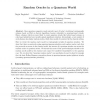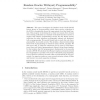139 search results - page 6 / 28 » Cryptographic Randomized Response Techniques |
CHES
1999
Springer
14 years 2 months ago
1999
Springer
The strength of a cryptographic function depends on the amount of entropy in the cryptovariables that are used as keys. Using a large key length with a strong algorithm is false co...
IJISEC
2006
13 years 9 months ago
2006
Abstract Privacy has become a factor of increasing importance in auction design. We propose general techniques for cryptographic first-price and (M + 1)st-price auction protocols t...
CORR
2010
Springer
13 years 10 months ago
2010
Springer
Once quantum computers reach maturity most of today's traditional cryptographic schemes based on RSA or discrete logarithms become vulnerable to quantum-based attacks. Hence, ...
ASIACRYPT
2010
Springer
13 years 8 months ago
2010
Springer
This paper investigates the Random Oracle Model (ROM) feature known as programmability, which allows security reductions in the ROM to dynamically choose the range points of an ide...
CHES
2005
Springer
14 years 3 months ago
2005
Springer
Embedded devices implementing cryptographic services are the result of a trade-off between cost, performance and security. Aside from flaws in the protocols and the algorithms us...


